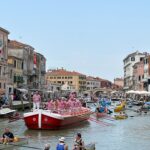
Words & Images by Mike Piercy,
Venice lover and friend of Views on Venice
Have you ever felt a sense of grief on finishing a book? After all thirty-two of Donna Leon’s Brunetti series there is a profound sense of loss. Bereft.
To the uninitiated, Commissario Brunetti is a Police Commissioner in Venice. Of lowly Venetian birth he marries the daughter of a native aristocratic family – she a university lecturer in English Literature. Brunetti, Guido, studied Law at university where they met, and then joined the police force.
Literate (not literary) I found something compulsively addictive in Donna Leon’s captivating stories about the Venetian detective. Yes, I have always enjoyed a good ‘whodunnit’, but this is a reader’s equivalent of crack cocaine. I’d read all of Agatha Christie’s books in my early teenage years and, subsequently, enjoyed other series; so what is it about these stories?
There is a wealth of reasons but perhaps, in essence, it is because the books are about far more than crime. Like Donna Leon, who lived in Venice for some thirty years, I too fell in love with ‘La Serenissima’. There is something other-worldly about the place. Most recently, after many short visits, I spent a month there, decompressing after twenty-five years as Head of three different schools. I was also trying my own hand at writing, initially about recollections of my own career along with thoughts about teaching and education.
An early morning walk through the calle, passing through an almost deserted St. Mark’s Square, along the Riva Degli Schiavoni; alternatively over the Accademia bridge into Dorsoduro, either of which providing effective thinking time. Such inspiring surroundings. Leon cleverly makes reference to city locations – some the obvious tourist sites but many off the beaten track. Precise locations of crime scenes or palazzi cannot be identified – for good reason. Walking a fondamenta, looking up at a building, the imagination suggests this was indeed the place or palazzo. It has to be.
Setting, therefore, is key. Not to have visited Venice is not to understand – the beauty is unsurpassed. Yes, there is some decay; buildings declining, sinking, rotting on their marshy foundations. Yes, there are empty shops, just as on a British High Street. Yes, the calle can be thronged, not least when a cruise ship comes in. But all of that is part of its beauty and uniqueness. Bin men, Amazon, building materials, laundry, groceries all arrive by barge. The vaporetti, steamy in winter, baking in summer, play dodgems with water taxis and the fleets of barges. Leon captures all of this in her writing as Brunetti leaves the police headquarters, The Questura, found on Rio di San Lorenzo in the district of Castello, both in fiction and reality. Stand on Accademia Bridge. Look east to the Basilica Santa Maria Della Salute – an iconic Venetian view – or west into the Grand Canal and its palazzi. Once seen, never forgotten.


In a broader social, moral, cultural, political and religious context, Leon does not shy from passing comment. She laments the decline of the native Veneziani population, forced out by cost and the proliferation of hospitality catering to the hordes of tourists. Now around 50 000, the population was some 120 000 in the 1950s. Her observations about corruption, the church and big government may have lost her some friends but her boldness in questioning such matters which are central to Italy, and not just Venice, is to be admired.
The Questura, Brunetti’s place of work, houses a rum old group of people – as with any organization, I suppose. His friend and trusty Inspector, Vianello, is his sounding board, their conversations often the voice for the author’s views on all matters political or cultural. The enterprising, glamorous secretary (about whom there is more than a whiff of mystique) ranks amongst premier league hackers, thus an inexhaustible source of information to Brunetti in an investigation. It is his boss, however, who stands out for his haughtiness and vanity; an intellect which falls far below that of Brunetti, indeed it plumbs the depths. Brunetti plays him with a deftness, with admirable, frequent self-restraint. Their encounters, so beautifully written, are often laugh out loud for the reader.
Another central piece of characterization is the relationship, the interplay, between Guido and his wife, Paola. He will come home of an evening, the family and the reader treated to gourmet cooking and carefully chosen wines. She – often with head buried in a Henry James novel – is Brunetti’s confidante and mentor. It is through their conversations we understand the nuances of any matter he is investigating, the direction of travel always mapped with humanity. The ageless children, too, play their part through lively dinner conversation, Leon gently reminding us of the responsibilities which come with parenthood.
And what of plot? Brunetti’s Venice – Donne Leon’s Venice – is not littered with bodies. In fact, murder is surprisingly scarce. Crime tends to revolve more around pickpocketing, burglary, fraud and corruption, with violence refreshingly rare. When it does come it is therefore all the more striking. No, these crime novels are really about Venice, its history, its people, its magic. All of this is packaged cleverly around a policeman and his family; cultured, civilized, compelling.
Thirty-two brilliant books with not even the slightest hint of writer fatigue; never-fading plot, sublime characterization and enchanting turn of phrase. The twinkle in Donna Leon’s eye can be found in her words.
What next? Bereft.







